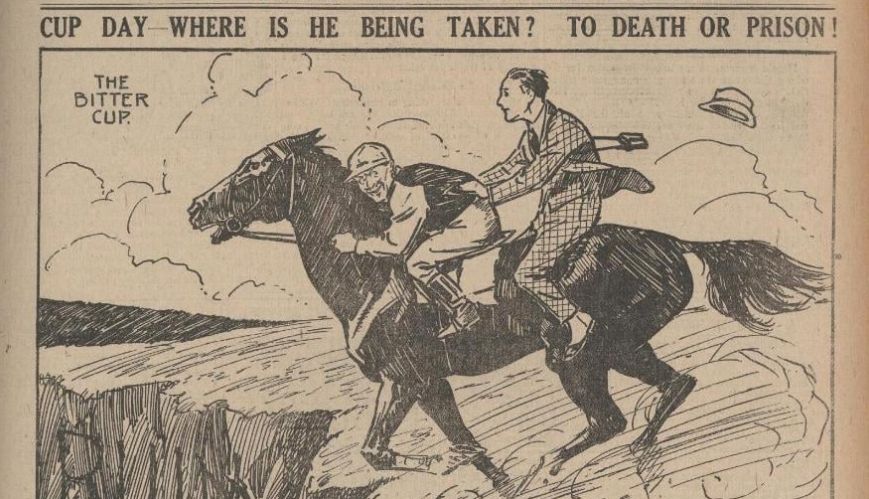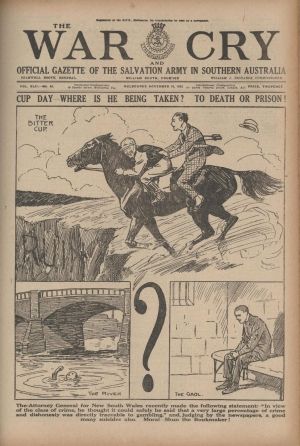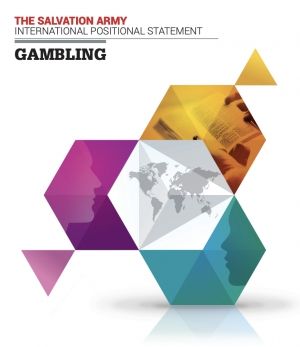The Army's stance on the Melbourne 'Bitter' Cup

The Army's stance on the Melbourne 'Bitter' Cup
1 November 2022
The front page of the War Cry on 19 November 1923 depicts a jockey, with a punter in tow, riding over a cliff under the headline: Cup day – where is he being taken? Death or prison!
The Melbourne Cup has been run for another year, with Australians betting more than $220 million on the famous horse race. More than $660 million has been invested over the four days of the Melbourne Cup carnival alone.
Breaking it down, Australians, on average, will spend almost $180 each on the Melbourne Cup today as punters and workplaces around the nation revel in one of the biggest social events on the calendar.
However, behind all the glitz and glamour lurks a darker side; the harsh reality of gambling addiction. In short, the majority of punters today will have lost money, and there will always be more losers than winners.
An estimated 80 per cent of Australians engage in some form of gambling – the highest rate of any country in the world – and lose in the region of $25 billion per year on betting. Australians fork out around $30 billion on horse racing alone each year.
The late Australian politician John Kaye was not afraid of launching a full-on assault on the horse-racing industry during his time on the NSW Legislative Council, especially against the Melbourne Cup.
“Many participants in Melbourne Cup celebrations are blissfully unaware of the harsh reality that the industry plays a major role in the climbing toll of gambling addiction. The Melbourne Cup plays a role in perpetuating and normalising the billions that Australians spend each year on gambling,” he was quoted as saying before the 2015 Melbourne Cup, adding how a University of Sydney study found that participation rates for race gambling are significantly higher in young people who are more vulnerable to gambling addiction.
 The front page of the 1923 edition of the Australian Southern Territory’s War Cry, focusing on the Melbourne Cup.
The front page of the 1923 edition of the Australian Southern Territory’s War Cry, focusing on the Melbourne Cup. So, where does The Salvation Army stand on all of this? It is no secret that the Army is an outspoken opponent of gambling and sees its devastating effects on the people it serves daily.
The fun and excitement invested in one day of the year often hides a sinister underbelly of gambling addiction, and The Salvation Army pulls no punches when it comes to its International Positional Statement on the social ill.
Almost 100 years ago, it was no different, and, in fact, The Salvation Army devoted the front page of its official newspaper, The War Cry, to the Melbourne Cup, complete with a drawing of a cup jockey riding over a cliff with a punter in tow, and calling the race ‘The Bitter Cup’.
Under the main image were two smaller drawings of the same punter throwing himself in a river or landing in gaol. At the bottom of the page were the words: The Attorney General for New South Wales recently made the following statement: “In view of the class of crime, he thought it could safely be said that a very large percentage of crime and dishonesty was directly traceable to gambling,” and judging by the newspapers, a good many suicides also. Moral – Shun the Bookmaker!
Today, The Salvation Army has gambling addiction recovery programs in many centres around Australia.
“I’ve seen first-hand the harm that gambling can cause, and it’s devastating,” says Major Claire Emerton, a Salvation Army officer in Melbourne. “I’ve seen gambling drive people to the brink of suicide because it can impact every area of their life.”
Claire was motivated to co-create The Salvation Army’s first Gambling Harm Working Group, existing to bring awareness to the issue, provide training, act as a sounding board for officers and employees, and create systemic change through policy.
The Salvos’ work on gambling addiction in Australia is backed by the International Positional Statement on gambling, with the following information taken from the International Social Justice Commission page on the International Headquarters website.
* Gambling figures sourced from Australian Gambling Statistics
Salvation Army statement of position on gambling
The Salvation Army is opposed to gambling. The nature of gambling lends itself to exploitative, deceptive and manipulative practices. It is contrary to Christian principles of love, freedom from oppression and concern for others. As such, it should not be a means of income generation or economic development, whether by government agencies, charitable organisations, churches or commercial interests.
Grounds for the position of The Salvation Army

The Salvation Army believes that all our resources ultimately belong to God and that we have the responsibility to use money productively, to guard against greed, and to avoid gaining at the expense of others (see 1 Timothy 6:3-10; 17-19).
Gambling runs counter to Christian teachings about love, respect, self-control and compassion for others (see Galatians 5:22-23). Those who may be at low risk of becoming problem gamblers still have a responsibility to protect those who are at greater risk (see 1 Corinthians 8:9).
It is not for anyone to condemn or judge those who suffer from addiction (see Luke 6:37). We all have our own weaknesses. Christian principles teach us to help problem gamblers to recover, be whole persons and regain self‑respect.
Governments are supposed to be God’s servants and seek the welfare of society as a whole. When the state uses gambling to collect revenue from a vulnerable population, it is not acting in good faith towards the citizens it is to serve.
Practical responses
1. The Salvation Army has concern for everyone suffering from gambling dependency and those impacted by their actions. Salvation Army soldiers commit to abstain from gambling in any form. In the context of fundraising for charities, Salvationists are encouraged to make donations rather than participate in gambling activities.
2. The Salvation Army encourages everyone to understand the risks of gambling and will encourage education and prevention programmes to this end.
3. The Salvation Army engages in advocacy with governments, commercial entities and individuals concerning the inherent dangers of gambling and the suffering it inflicts on gamblers and their families.
4. The Salvation Army opposes the stigmatisation of those suffering from a gambling dependency. It seeks to support gamblers and their families through the provision of education, counselling and rehabilitation programmes. In so doing, The Salvation Army uses a holistic approach that fosters psychological, social and spiritual wellbeing.
The positional statement was approved by the General on June 2012. The views expressed in this International Positional Statement constitute the official position of The Salvation Army on the issue addressed, and they may not be modified or adapted in any way without the express written permission of International Headquarters.
Comments
But we take money from gambling why